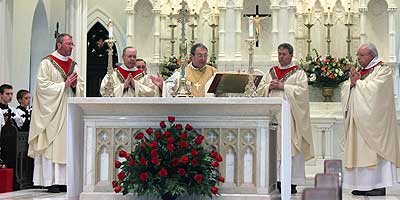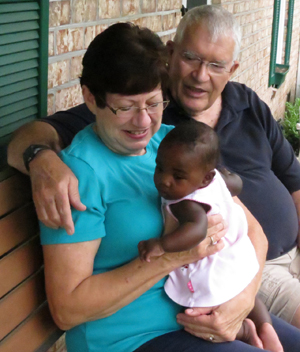
CHARLESTON—Bishop Robert E. Guglielmone celebrated Mass for the sanctity of human life at the Cathedral of St. John the Baptist on Jan. 22, the 40th anniversary of the Supreme Court decision on Roe v. Wade.
His homily is as follows:
“A few years ago, I was strongly affected by a poster that I saw in a church on Long Island. It included a picture of a beautiful and magnificent playground with swings, slides, sandboxes and all kinds of opportunities for activity and games. The one thing missing in the picture was the presence of people and the caption at the bottom of the poster said: “Where have all the children gone?”
“It’s a good question: ‘Where have they gone?’ Since 1973, and the infamous Roe v. Wade Supreme Court decision, over 54 million children have been aborted in the United States. And since that date, when abortions were permitted only in the first trimester of pregnancy and only under certain restrictions in later stages of pregnancy, abortions have become legal at any stage of a pregnancy. Think of that number — 54 million; greater than any war the world has seen; greater than the number natural disasters have claimed in the entire 20th century; almost 20 percent of the current U.S. population.
“At present there is an abortion performed in this country every 26 seconds and, sadly, 73 percent of all women who have abortions report being religiously affiliated (2011 Marist Poll). What the late Pope John Paul II described as the “Culture of Death” is very much a reality, and not only in the United States, but in many parts of the world.
“Pope Benedict XVI described the anti-life policies of so many countries in our world as not only an affront to the dignity of human life, but also a major factor in an alarming social deterioration of the human family. The Holy Father in his 2009 encyclical “Caritas in Veritate” describes the logical social impact that these policies will create. For example, when he deals with the question of population growth and the negative viewing of that growth, the only result of such a disordered anti-life notion will be a more impoverished notion of life and family. He cites declining birth rates (below replacement levels in many countries, especially in western Europe) as leading to strained social welfare systems, increased costs, decreased savings and investments, reductions in the labor force and increased social isolation in smaller families. All of these factors diminish the quality of life of the individual, the family and society and will ultimately lead to the death of all three.
“Our own country is beginning to face these very results. However, because of immigration, both documented and undocumented, the pace toward these negative results is slowed. Some of this I can see in our own diocese: Where are the children? They are very present at the Masses we celebrate in Spanish, not nearly as present in the English speaking Masses. Where are the workers we need in agriculture, domestic service and even in some fields of medicine?

“Again, look to the immigrant. Where are our priests and sisters? Certainly not coming from our large families that used to produce many vocations in the past — there are not too many of those around anymore.
“However, even the immigrant population is beginning to be affected by this abortive and contraceptive mentality that is such a part of our American experience at the present time. Where are the children? Where are our future workers, our future inventors, our future priests and sisters? Has the one who might have invented a cure for cancer been aborted, or the future leader who might actually have brought peace to our world?
“Who has this world lost in the 54 million that were never even given a chance to make a difference in this difficult world of ours?
“What is the central issue? The legality of abortion revolves around the fundamental question of when human life actually begins. In 1973, the Supreme Court ignored this basic issue by citing a common tradition of not recognizing the unborn as “persons in the whole sense.” As a result, the unborn do not enjoy the legal protection to life afforded by the 14th amendment to the Constitution.
“In contrast, the Church has a very clear position on the beginning of life: “The Catechism of the Catholic Church” (2258) explains that “human life is sacred because from its beginning it involves the creative action of God and it remains forever in a special relationship with the Creator who is its sole end. God alone is the Lord of life from its beginning until its end: no one can under any circumstance claim for himself the right directly to destroy an innocent human being.”
“As it specifically regards abortion, the catechism states that human life is to be respected and protected from the moment of conception. That is when human life begins.
“The New Testament supports this view. Remember the story of the Visitation, when Mary the mother of Jesus visits her cousin Elizabeth. The baby in Elizabeth’s womb leaps for joy when Mary, carrying Jesus in her own womb, approaches. There is a recognition of the presence of the Lord on the part of the unborn John the Baptist; this is not an action of a fetus in the process of becoming human, it is an action of a human being in the early stages of development.
“Do we then as Catholic Christians have a choice? Our faith tells us that abortion is the taking of a human life. We must stand up for life and do all that we can to prevent the taking of innocent human life in the womb. Therefore we must continue — continue to pray constantly that this horrible practice be ended and that those women who find themselves in a difficult situation of an unplanned and unwanted pregnancy receive and accept the grace to choose life.
“Secondly, the effort to raise awareness of the evil of abortion must continue: In our efforts for education, especially of the young; in our continued efforts to reach legislators on federal, state and local levels to effect whatever positive changes are possible; in our participation in national and state rallies which raise consciousness about the issue, such as the March for Life in Washington, D.C., this Friday and the gathering in Columbia in the earlier part of this month.
“And finally, we must do what we can to provide help and assistance to those women who find themselves in these difficult circumstances. Birthright is one way we help; our diocesan plan to construct our first home for young women in the process of an unexpected pregnancy in the Greenville area is another. The St. Clare Home will offer assistance to those women who choose to have their baby and not to abort.
“Our participation in these activities is all the more crucial as we see continued government interference with our rights as a Church to determine what our religious ministries are. The mandates called for by the Department of Health and Human Services in the Affordable Care Act indicate that certain ministries in our Church do not qualify as religious activity and, therefore, will not be exempt from complying with directives that are clearly opposed to our faith beliefs.
“So here we are. Let us continue in our resolve to do all we can to promote the right to life for every human being. May the Spirit of God enliven us and sustain us.”
Photos provided by Kathy Schmugge.


